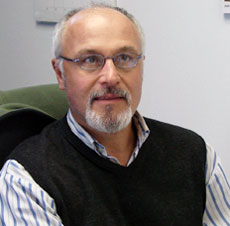Navigation
Did you know?
College of Agriculture, Engineering and Science
Prof Renzo Perissinotto

Personal Information - Born in Venice, Italy, 1958.
- Completed Laurea degree ( BSc-Hons) at the University of Padua, Italy.
- Completed PhD in Oceanography at Dalhousie University (Halifax, Canada).
- Did postdoc at Rhodes University and later appointed as principal research officer with the Southern Ocean Group there (biological oceanography of Marion Island & high Antarctic), from 1989 till 1996.
- Taught for 2 years at Fort Hare (1996-1997) and started research thrust on estuaries.
- Moved to UKZN, first as Director of Marine Science Unit at UDW (1998-1999) and then at UND (2000). Part of the UKZN academic staff since, as full Prof from 2006.
Research Interests
- Ecosystem functioning and management of St Lucia estuarine lake
St Lucia is Africa’s largest estuarine lake and South Africa’s first UNESCO World Heritage Site. It is currently undergoing an unprecedented crisis in terms of conservation and management. Dedicated research effort is required in order to sustain the ecological goods and services that this ecosystem provides to the entire south-east African region. - Biodiversity of estuarine systems Worldwide estuaries are under threat. They are arguably the most vulnerable ecosystems to the changes that man’s activities have imposed on the coastal zone. In South Africa, the factors impacting most negatively on our estuaries are: catchment modifications, residential developments, consumptive and non-consumptive uses, freshwater abstraction, domestic and industrial discharges, invasive species and climatic changes.
- Ecophysiology and taxonomy of invertebrates Information on key and keystone invertebrate species is often lacking, in particular regarding their energy budget, resilience and tolerance to natural and human-induced fluctuations in physico-chemical factors. Many species also remain undescribed and/or reported under erroneous identification.
- Southern Ocean food webs This is a remnant from my past involvement in the South African and French Antarctic and Subantarctic marine programmes.